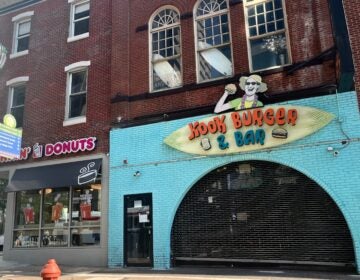In Trenton, Halo Farm fights for its name — and its customers’ colons

A customer peers through the picture windows at Halo Farm Thursday afternoon to see the packaging process at the creamery. (Dana DiFilippo/WHYY)
Think of Trenton, New Jersey, and certain things leap to mind: the Trenton Makes Bridge, the scrappy Trentonian tabloid, the Roebling Wire Works, and of course, government corruption.
And then there’s Halo Farm.
Since it opened in 1975, the creamery just past the capital city’s northern border has drawn countless customers from around the region, lured both by Halo’s hormone-free, locally sourced milk and ice-cream and by its picture windows offering a behind-the-scenes peek at the packaging process.
But in recent months, an out-of-town creamery with a suspiciously similar-sounding name has started selling its products in area markets.
So Halo Farm now is taking Halo Top to court.
Attorneys for the Trenton creamery accuse Halo Top, a brand of California-based Eden Creamery, of trademark infringement and unfair competition, according to a federal lawsuit filed April 13. They are demanding that Eden Creamery quit using the Halo Top name and selling Halo Top products, and destroy all existing Halo Top items – and not just because Halo Top sounds “confusingly similar” to Halo Farm.
They also don’t want Halo Farm fans to blame them if they get gassy and bloated or develop diarrhea and bellyaches.
Halo Top, it turns out, sells “healthy” ice cream they tout as low-calorie, high-protein and low-sugar. But they do so, according to Halo Farm’s complaint, by using the sweetener stevia, prebiotic fiber and the sugar alcohol erythritol – ingredients that can cause unpleasant stomach and intestinal issues.
Marjorie Brevidoro, a Halo Top spokeswoman, said the company can’t comment on pending litigation. Halo Farm’s president Kathleen Arnold also declined to comment.
A lawsuit lamenting flatulence shouldn’t be surprising to those who know Halo Farm.
It was founded by the late Jerry Reilly, a former dancer and businessman with such a larger-than-life personality that he wasn’t shy about sharing stories about the drinking games he played with actor Paul Newman, who he roomed with in college. And the creamery itself is known for its quirk, from its funny billboard slogans (“World’s Largest Micro-Dairy!” and “Halo Farm Makes, Trenton Takes”) to the shiny golden calf perched atop its delivery trucks to its Instagram-worthy herd of fiberglass cows grazing beside its parking lot.
But the harm Halo Farm fears Halo Top could cause is a serious concern, according to the lawsuit.
Store sales at the Trenton creamery have totalled $6 million a year for the past five years, with sales at Halo Farm ice-cream parlors in nearby Princeton and Hamilton bringing in another $5 million since 2012, according to the lawsuit.
And Halo Farm donates “tens of thousands of dollars” of its products a year and has regularly financially supported Newman’s “Hole in the Wall Gang” children’s camp, the lawsuit says. Such charity has created “an extremely valuable goodwill” that Halo Top is unfairly commandeering, attorneys Mark H. Anania and Carissa L. Rodrigue wrote in the complaint.
Though the two creameries’ names may be similar, their histories are not. Reilly created Halo Farm four decades ago, figuring he’d be able to sell fresher, more affordable dairy items if he didn’t truck perishable products for miles and miles.
A “bored hypoglycemic attorney” named Justin Woolverton, meanwhile, created Halo Top in 2011 to both chart a new career path and sate his own ice cream cravings.
WHYY is your source for fact-based, in-depth journalism and information. As a nonprofit organization, we rely on financial support from readers like you. Please give today.




